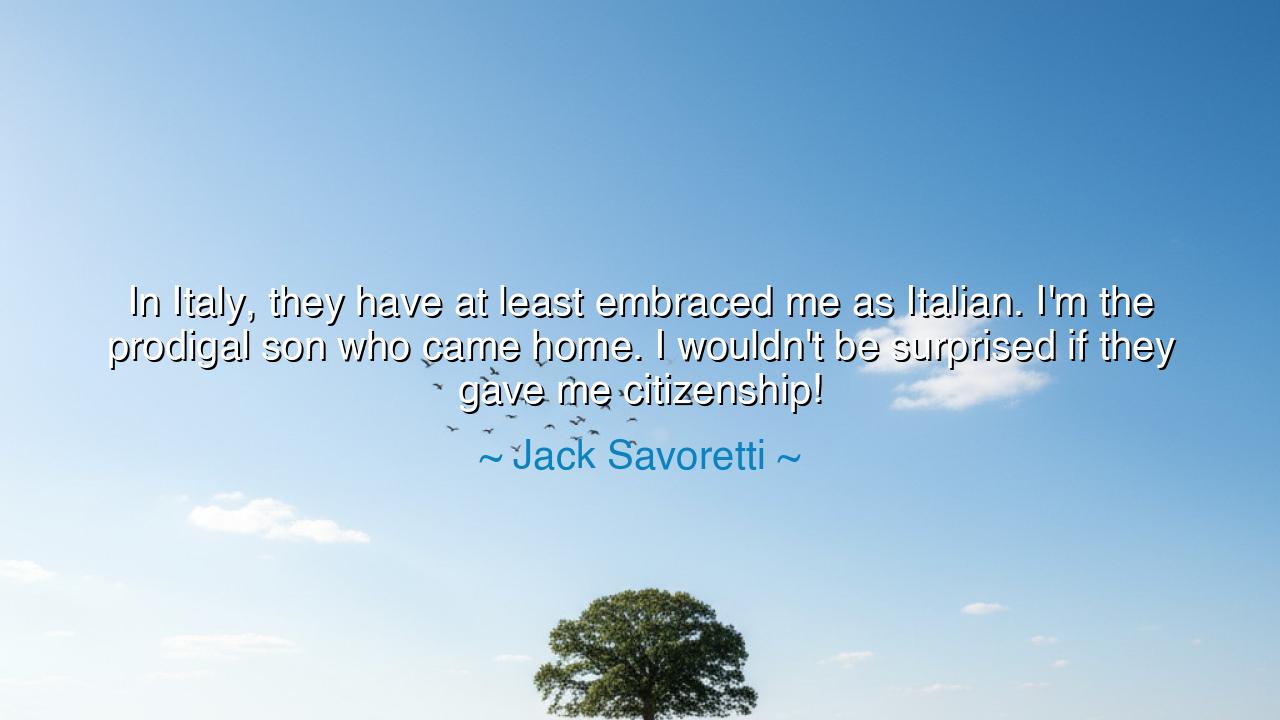
In Italy, they have at least embraced me as Italian. I'm the
In Italy, they have at least embraced me as Italian. I'm the prodigal son who came home. I wouldn't be surprised if they gave me citizenship!






In the days when elders spoke beneath cypress shade and weighed each word like grain, they told of the wanderer who left his village with a heart full of hunger and a name braided from two homelands. Hear now a modern echo of that old road: “In Italy, they have at least embraced me as Italian. I’m the prodigal son who came home. I wouldn’t be surprised if they gave me citizenship!” Thus speaks Jack Savoretti, and in his saying we taste the sweetness and sting of belonging. His words carry the salt of seas crossed and the warmth of kitchens where grandmothers keep the language alive in sauce and song. To be embraced is not merely to be recognized; it is to be received—as a son returning, as a name restored.
The prodigal son—ancient parable and evergreen truth—does not return with perfect credentials, but with a story of roads and a face marked by weather. In calling himself such, the singer invokes a lineage older than marble: the grace of a people who remember that family is larger than the house, and home is larger than the map. When a land calls you by your true name—Italian—it stitches your wandering to its fabric, makes your journey part of its own tapestry. Citizenship in this sense is not just paper and seal; it is a sacrament of recognition, a public vow that says, “You are ours, and we are yours.”
Yet this embrace is not effortless. Among the ancients it was taught that identity is a river: it keeps its name, but the waters are always new. The traveler who returns may bring foreign chords to an old melody; the village must listen with both memory and curiosity. When Savoretti says he has been embraced, he hints at the courage of two sides: the sojourner who risks return, and the homeland that risks welcome. Between them lives the miracle that turns strangers into kin, and passports into promises.
Consider a story from our own age, fit for the annals. In Liguria there was a mason’s daughter—let us call her Caterina—whose family sailed to Buenos Aires a century past. She grew up with tango in her footsteps and dialect in her prayers. In winter she hummed the lullabies her nonna had woven in a hillside town she had never seen. In her seventieth year she finally returned. She stood before a church her ancestors helped build and wept. The villagers did not ask for proofs; they recognized her in the way she crossed herself and lingered over olives. They brought her inside, saying, “Bentornata.” And though her passport named another country, the bells tolled for a daughter come home. No council decree bestowed it, yet it felt like citizenship all the same.
History sings this chorus too. When Italy called back her diaspora to rebuild after wars and winters, men and women returned with new crafts and old stories. They were bakers who had learned patience in New York, stonemasons who had wrestled wind in Mar del Plata, singers who had learned to carry silence between notes. Towns were renewed not by blood alone, but by the mingling of far roads into one square. Thus the embrace of a homeland was not nostalgia, but covenant: “Bring us what the world taught you, and we will call it ours.”
The lesson is plain as a sunlit piazza: identity ripens when it is tested, and home grows larger when it welcomes the traveler’s change. To the one who wonders whether they may return: go. Carry your borrowed words and your mother’s recipes. Learn again how your name sounds when spoken by old stone and open arms. To the homeland that wonders whether it can receive: open the gate. Make room at the table for accents, for hybrid songs, for the awkward grace of someone finding the beat again. Let the title Italian (or whatever name is yours) be a bridge, not a fence.
Take these actions as you walk: keep a living record of your lineage—letters, recipes, lullabies—so that your story remains braided with those who came before. Learn the tongue of your ancestors until it can bless and be blessed. When you return, offer service before claim: volunteer in the town square, sing in the small church, buy bread from the oldest bakery, ask the elders for their stories. And if you are the one who waits at the gate, practice the ancient art of the embrace: greet the wanderer by name, invite them to break bread, and let your welcome be so generous that even without parchment, they feel the quiet, indelible seal of citizenship. For in this, as the fathers and mothers taught, we make of the world a family, and of every prodigal son a brother restored.






AAdministratorAdministrator
Welcome, honored guests. Please leave a comment, we will respond soon